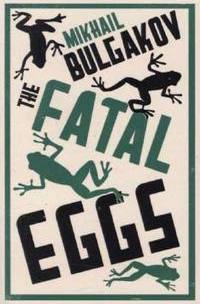
übersetzt von Roger Cockrell, 2011 – gelesen als e-Book
Der Besprechung von The Economist (siehe unten) ist nicht viel hinzuzufügen. Mein persönlicher Eindruck ist:
- Der Roman ist bei aller Kürze (im e-Book nur gerade 110 Seiten) eine Mischung von Science und Social Fiction. Als Science Fiction reflektiert er den wissenschaftlichen Kontext der Zeit seiner Publikation (1925). Die Social Fiction gelingt dem Autor als beissende Karikatur der Sowjet-Gründerjahre; allerdings verpackt er die Karikatur so geschickt in gerissenen schwejk’schen Humor, dass die damaligen Zensoren überfordert werden und die Publikation 1925 gestatten.
- Die von The Economist geschlagene Brücke zur aktuellen Covid-19-Situation ist vielleicht etwas weit hergeholt; sie stimmt insofern, als es sowohl bei The Fatal Eggs als auch bei mindestens einer der Verschwörungstheorien hinter Covid-19 um aus dem Ruder gelaufene Labor-Experimente geht.
- Die Qualifikation ‚avoidable plague‘ hinkt allerdings, denn bei Covid-19 handelt es sich – beim mehrheitlich als gesichert angesehenen Wissensstand 2020 – um eine Seuche, die durch ein zu nahes Auf- und Beieinander von Mensch und Tier entstanden ist, und deren Ausbreitung allenfalls durch bürokratische Fehler und Versäumnisse begünstigt wurden; bei The Fatal Eggs ist die Vermeidbarkeit darin begründet, als der Mensch an sich frei – und gefordert – ist, bei Laborexperimenten eingegangene Risiken, insbesondere biologische Risiken, zu begrenzen und allfällige Fehlentwicklungen a priori einzudämmen.
- Die Lektüre ist spannend. Der wissenschaftliche Ansatz ist ziemlich frei erfunden und liegt – nach meinem Kenntnisstand – heute, d.h. fast hundert Jahre später, immer noch im Bereich der Fantasie; der Einblick auf die gesellschaftlichen und kulturellen Rahmenbedingungen der frühen Jahre der Sowjetunion ist erhellend und – im Hinblick auf das, was dann daraus wurde – bedrückend.
- Die e-Book-Ausgabe in der Übersetzung von Roger Cockrell enthält informative Fussnoten/Anmerkungen, eine Biografie des Autors Mikhail Bulgakov, sowie ein Verzeichnis dessen Werke samt Werkbesprechungen.
Besprechung des Buchs in The Economist, March 28, 2020
Books and Art – The yolk of fate – Bulgakov’s biting vision of an avoidable plague:
«The Fatal Eggs» is a parable of bureaucratic bungling and drastic countermeasures.
The Fatal Eggs. By Mikhail Bulgakov. Translated by Hugh Aplin. Hesperus Press; 112 pages; £6.99.
When professor Vladimir Persikov’s wife runs off with an opera singer, she leaves him a note. “An unbearable shudder of revulsion is aroused in me by your frogs,” she tells him. In “The Fatal Eggs”, a little-known novella by Mikhail Bulgakov, a pestilence spawned by the professor’s zoological research threatens not just his marriage, but civilisation itself.
The scourge in the story—published in 1925 and set three years later—is not a disease, exactly. In their imagination of epidemics, novels such as Mary Shelley’s «The Last Man», «The Plague» by Albert Camus or José Saramago’s haunting «Blindness» might seem more apposite in the time of Covid-19. Nor is this biting tale Bulgakov’s finest work (that is his satirical fantasia, «The Master and Margarita»). But as a parable of bureaucratic bungling, avoidable disaster and drastic countermeasures, it is horribly relevant.
In his laboratory in Moscow, Persikov discovers a ‚ray of life‘ that makes amoebae and tadpoles reproduce at speed. Thrilled, he orders extra kit from Germany and exotic eggs from across the Atlantic (like the virus, this is a globalised affair). Foreign powers covet the new technology, but the Soviet state requisitions it to help kick-start poultry production. The apparatchik in charge of the state farm, Alexander Faight, was once a flautist in Odessa; he is carrying his instrument when he encounters a giant serpent, which he tries to pacify with a waltz from «Eugene Onegin». He fails, and the beast eats his wife.
The Russian author takes digs at the church, heedless carousers in the streets, blinkered scientists—and, naturally, at the Bolsheviks. But his depiction of blasé, incompetent officialdom resonates across the ages and all forms of government. «Honest to God, it’ll work out», Faight says blithely of the poultry plan, like a president recommending an unproven drug. Disaster ensues because the authorities botch their deliveries, sending the hens’ eggs meant for the farm to Persikov, and his exotic specimens to the farm. Then, after the creatures hatch, the first, all-too familiar response is disbelief and denial. Faight stammers a report to two security agents; one thinks he is hallucinating, the other that a circus animal might have escaped. A newspaper editor dismisses an urgent telegram as a drunkard’s raving.
Before long, though, everyone goes berserk. Martial law is declared in Moscow amid a flood of refugees. Like quarantined Europeans applauding ambulances from their balconies, cowering citizens take to the pavements to salute the cavalrymen on their way to interspecies battle, and the marching gas squadrons «with breathing tubes over their shoulders and with cylinders on straps behind their backs». Artillery units bombard forests; aeroplanes spray poison. Civilian casualties mount. And, following a perennial instinct, vigilantes hunt for someone to blame.
In the end, the weather intervenes, as some hope it might today. An unseasonable summer frost kills the serpents and freezes the eggs, and a year after the trouble arose, it is all over. Moscow, Bulgakov writes encouragingly, «again began to dance, to burn and to spin with lights».